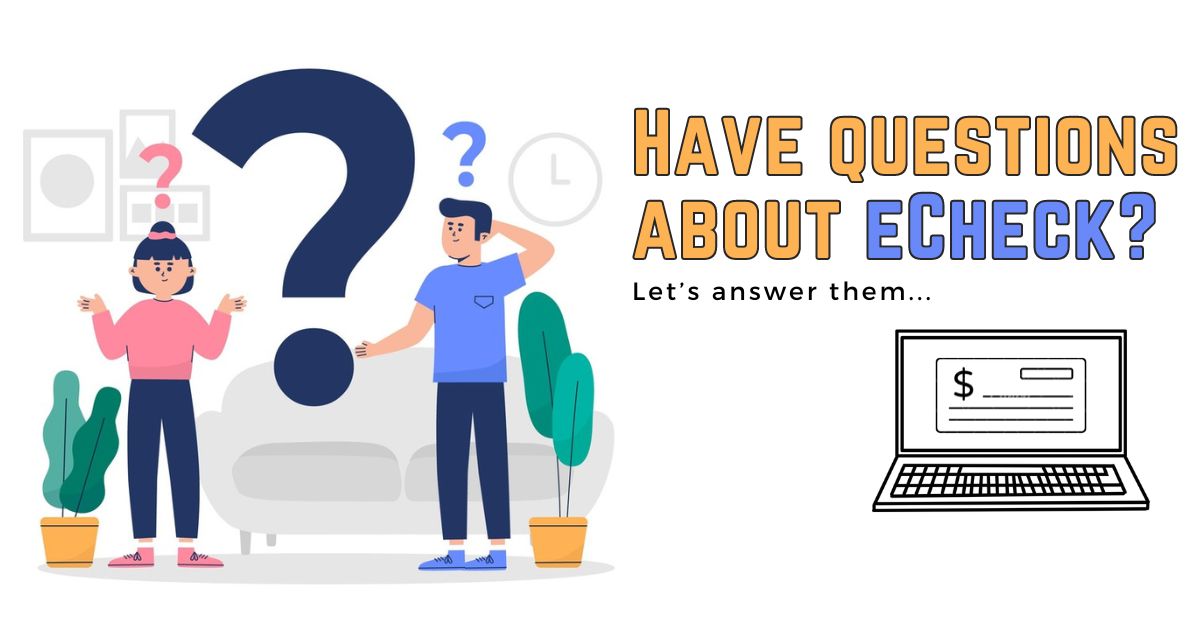
| November 15th, 2021 |
Have questions about eCheck? Let’s answer them!
With the growing popularity and use of digital payment methods, questions are bound to arise in the minds of customers about the preferred mode. eCheck has to be one of the upcoming and popular modes of payment processing. Here we answer prominent questions about eCheck and why it is a better model.
Why eCheck over paper check?
The digital revolution will slowly ensure that paper checks as a mode of payment will not have a bright future. The trend of writing paper checks has faded away, and digital modes of payment such as eCheck have become the first choice for many users. When consumers are making online purchases more than ever, digital modes of payment are obvious choices. The primary reason for preferring eCheck over paper check is the transmission mode; paper checks take their share of time and effort to execute. A customer needs to go all the way to the bank to deposit one. And the processing time in the bank isn’t fast either. eCheck, on the other hand, has a digital advantage automatically, making the process easier and more efficient.
How is eCheck different from credit card payment?
The primary difference between credit card payments and eCheck is the processing fee charged. Since eCheck uses ACH to transfer the requisite amounts, unlike the card networks used for credit card payments, automatically ensures lower processing fees. Credit card interchange fees are charged for credit card payments, whereas the same is not charged for eCheck acceptance.
How does eCheck processing work?
The first thing to be ready for accepting eCheck payments is to obtain important customer information such as account numbers and bank routing. Various modes can be adopted to procure the required information. However, the online method of procuring sensitive information is preferred to ensure greater security in the information received. Once the information is received, the customer’s bank can be communicated about the payment by the merchant bank. Once verification of the funds is done, debit happens through ACH.
The parties involved in eCheck payment processing are the originator, business bank, ACH operator, and the customer’s bank.
Originator: As the name suggests, the originator is responsible for initiating the transaction and obtaining the requisite information. The originator is the merchant for eCheck.
Business Bank: The business bank is responsible for placing the ACH entry on behalf of the Originator, collecting payments from various customers, and sending the same payments to an ACH operator. The originator bank is also known as the Originating Depository Financial Institution (ODFI).
ACH operator: The ACH operator is responsible for handling payment requests and directing the payments to the business bank.
The customer’s bank: The customer’s bank verifies the availability of funds and debits the customer’s account. They also credit the amount to the business account.
How to accept eChecks?
A business willing to accept eChecks needs to find a facilitator and a payment gateway for such transactions. Acceptance of eChecks also depends on where the eCheck is to be accepted. Businesses will need a check scanner to accept an eCheck at the point of sale. Similarly, they should be equipped with payment software to ensure eCheck acceptance online.
Conclusion:
For a customer, the availability of various payment methods makes it easier for them to make a choice. It increases the chances of them spending their money and automatically helps businesses to grow. By keeping eCheck as a mode of accepting payments, businesses can imagine better expansion for themselves.
